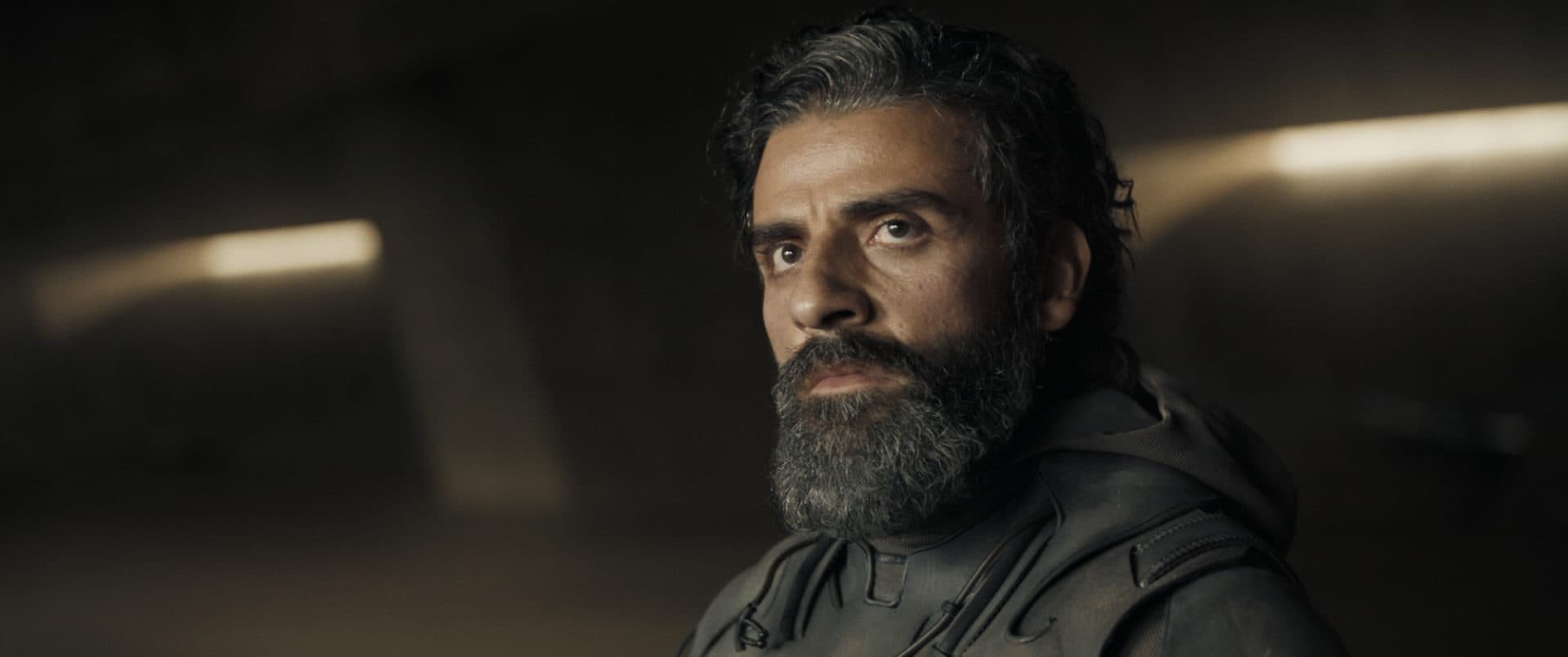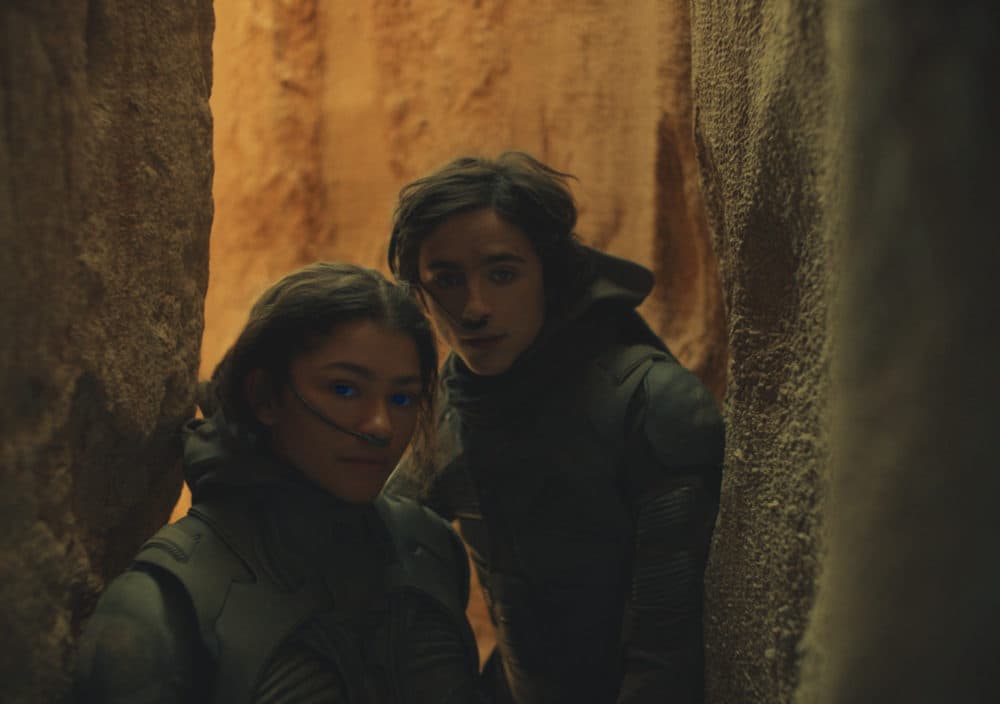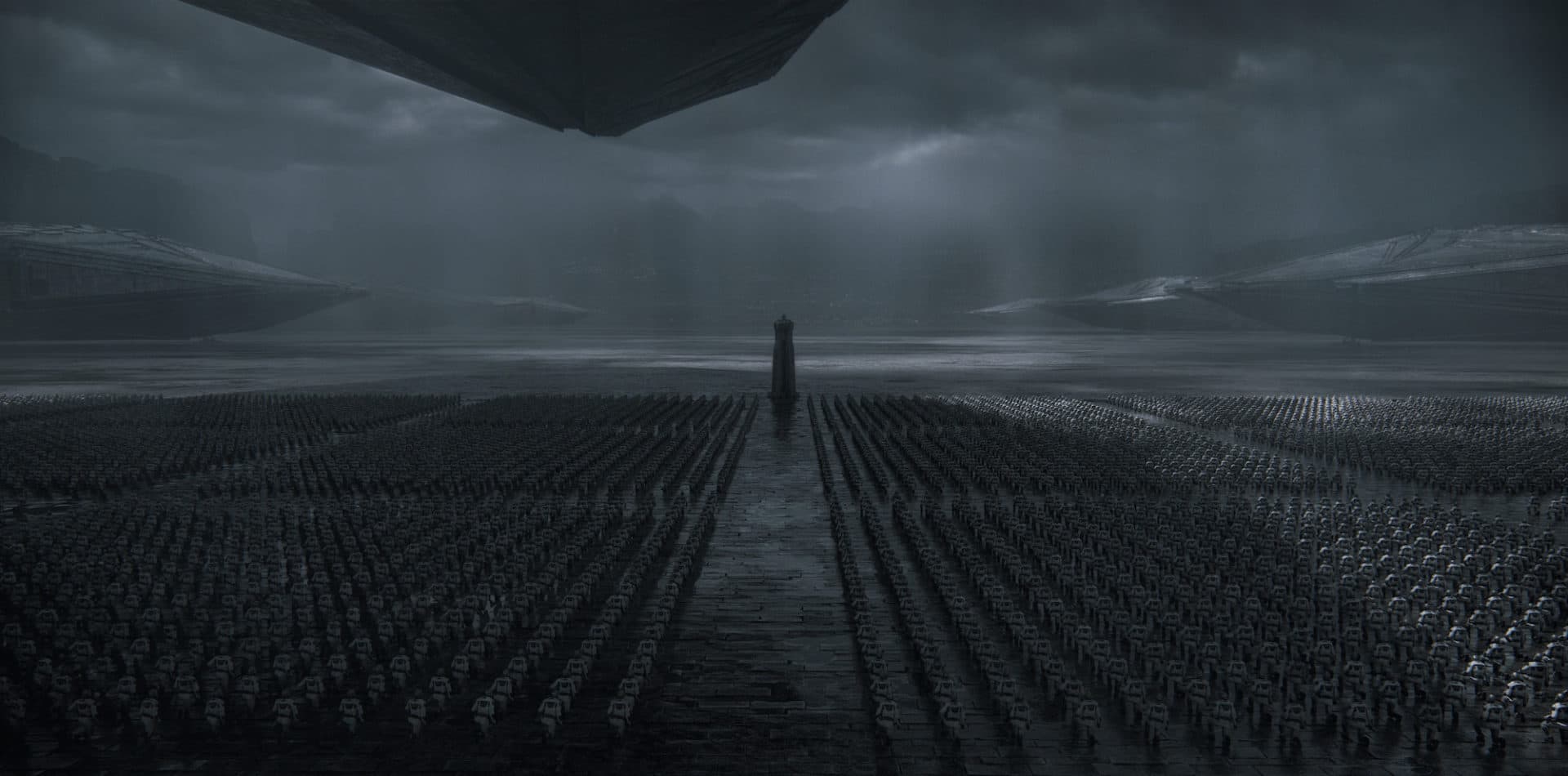Advertisement
Review
Sprawling epic 'Dune' is made for the big screen

Director Denis Villeneuve’s eagerly anticipated adaptation of Frank Herbert’s 1965 sci-fi eco-fable “Dune” is a gargantuan spectacle, as massive a movie as you’re going to see this year and possibly the next. I’m talking huge. The Québécois filmmaker has always had a steroidal, basso profundo sensibility, with pictures like “Sicario,” “Prisoners” and “Blade Runner 2049” stubbornly refusing to let scenes evolve organically, instead pumping every interaction up with a strained seriousness of purpose and quasi-religious import that this critic often found oppressive and even sometimes silly. But as it turns out, such doomy grandeur is exactly the right approach for “Dune,” infusing tedious trade treaty talks and lengthy exposition dumps with magisterial malevolence. It’s a full-bore commitment to the material, pummeling viewers with visual splendor and a sound mix that feels like an assault. You don’t watch “Dune” so much as you surrender to it. At least I did, quite happily.
Villeneuve (working with co-screenwriters Jon Spaihts and Eric Roth) has stripped most of the psychedelia from Herbert’s novel, focusing instead on a more easily digestible allegory. It’s the year 10,191 and the distant desert planet of Arakis is rich with a mineral called “spice” that must be mined as fuel for interstellar travel. The unseen emperor of the galaxy has placed the royal family from House Atreides in charge of harvesting operations, much to the consternation of the planet’s previous tenants the Harkonnen, who aren’t exactly thrilled about losing their entire income. The first chunk of the film is devoted to palace intrigue as the noble Duke Leto Atreides (a regal Oscar Isaac and his most excellent beard) attempts to broker an arrangement with the planet’s indigenous people — the seldom-seen, desert-dwelling Fremen, pointedly played by actors of color — while he and other members of House Atreides discover that someone’s been sabotaging their machinery.

It’s not exactly difficult to figure out that we’re watching a story of settler colonialism in an intergalactic Middle East. The spice is obviously oil, and we can tell that the Fremen are standing in for Arabs even when they aren't accompanied by the deafening ululations of Hans Zimmer’s score. (I know it might sound strange to be concerned with the races of people playing aliens from an imaginary planet, but it is a little curious that they didn’t cast any Middle Eastern actors given the nature of the story and the “exotic” music cues heralding the Fremen.)
Meanwhile, the Duke’s tremulous teenage son Paul (Timothée Chalamet) has been having visions of his death and the deaths of his loved ones, punctuated by fleeting glimpses of Zendaya looking fetching out there somewhere in the sand, literally the girl of his dreams. Paul’s mother (Rebecca Ferguson) comes from a long line of space witches, and she’s been sharpening the boy’s psychic abilities for untold tests that are about to take place. The Fremen have an ancient prophecy about a savior who sounds a lot like Paul, which is understandably terrifying to the 98 lb. weakling. Especially since all the people on this unfamiliar planet seem to recognize him for some reason.

Villeneuve has fashioned the film as a throwback to Hollywood widescreen epics, awash in visual references to “Lawrence of Arabia,” “Apocalypse Now” and I think I spotted some “El Cid” in there too, among others. (It also turns into Bergman’s “Hour of the Wolf” for a few minutes when Charlotte Rampling shows up as the leader of Ferguson’s coven.) “Dune” is for the most part a smashing entertainment, with a hearty, backslapping camaraderie among Isaac and stalwart soldiers played by Jason Momoa and Josh Brolin, all having a fine time affectionately teasing the wispy Chalamet as he begins to grow into his destiny.
It is, however, only the beginning. Billed in the opening titles as “Dune: Part One,” Villeneuve’s film covers what I’m told is roughly half of Herbert’s first novel, building not so much to an ending but rather a reasonably satisfying stopping point. Anyone who saw David Lynch’s garbled 1984 attempt to cram in all the source material already understands it’s basically impossible to tell the whole story within a regular running time, and indeed one of the reasons acid Western guru Alejandro Jodorowsky’s planned 1975 adaptation — which was to star Mick Jagger and Salvador Dali with a soundtrack by Pink Floyd — never happened was because no studio in Hollywood was insane enough to finance a 12-hour movie. Clocking in at a comparatively slender 155 minutes, Villeneuve’s first installment is mainly concerned with establishing the universe, leaving a perhaps inescapable air of disappointment when the closing credits roll midway through the tale.
Advertisement
Yet what a world to luxuriate in for a little while! Villenueve’s signature has always been emphasizing the smallness of his characters relative to their surroundings, which is perfectly suited for these vast, brutalist mining installations amid the endless amber sands of Arrakis. There’s so much pomp and circumstance to the characters’ comings and goings that Isaac’s Duke Leto even makes a winking joke about how much money these pointless ceremonies must be wasting. “Dune” is what they used to call a great “landing gear movie,” meaning that whenever a spaceship is about to land you better believe you’re gonna see the entire apparatus unfolding, instead of cutting straight to the arrival. I feel a great deal of affection toward this film’s profligate grandeur, which is another reason I’m baffled by the studio’s decision to stream “Dune” simultaneously on HBO Max.

An incensed Villeneuve has described watching the film on television (or heavens forbid, your phone) as akin to “driving a speedboat in your bathtub.” The statement was met with the usual hysterical online outrage you hear whenever a director like Christopher Nolan or Quentin Tarantino dares suggest that their movies are best seen on a big screen. It’s now become “elitist” or according to some, even “ableist” to wish for the art you just spent the last three years of your life creating to be experienced under optimum conditions. And while I understand that chain multiplexes like AMC and Landmark hardly qualify as “optimum,” we are blessed with some fine independent theaters in the Boston area, with the newly reopened Somerville Theatre screening “Dune” on what I believe to be the only 4K Laser projector in the Northeast. (There was one at the Jordan’s IMAX in Reading, but that’s still shuttered until further notice.)
As soon as the press screening was over I started making plans to see “Dune” again at the Somerville, but you better believe I won’t be watching it at home. Sometimes size does matter.
"Dune" is in theaters and streaming on HBO Max beginning Oct. 22.
